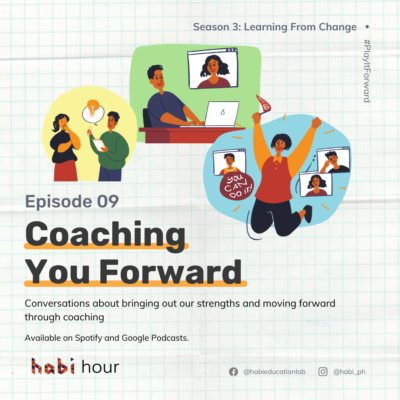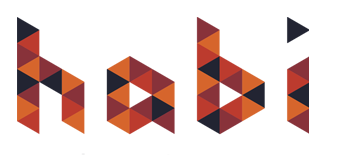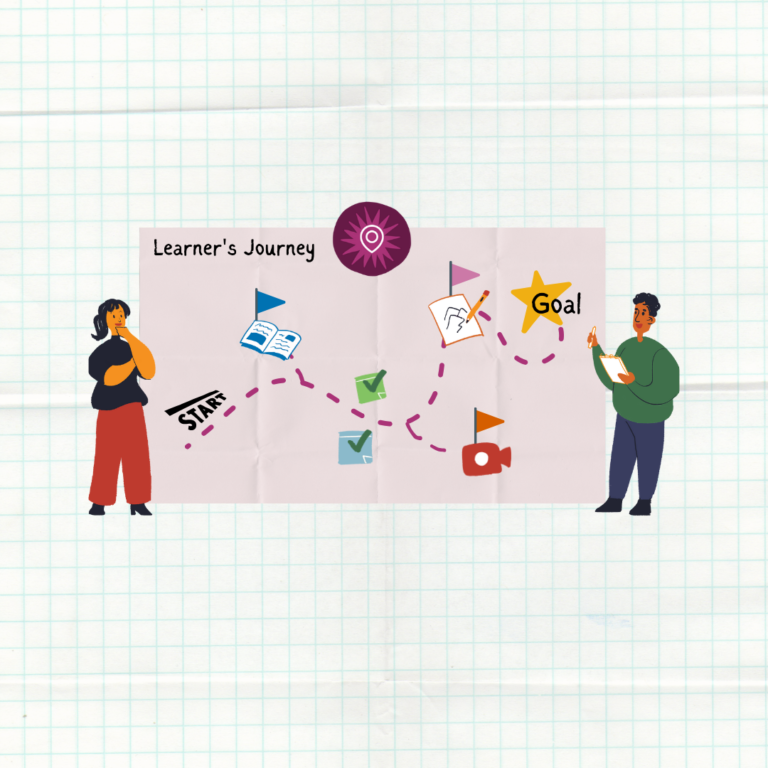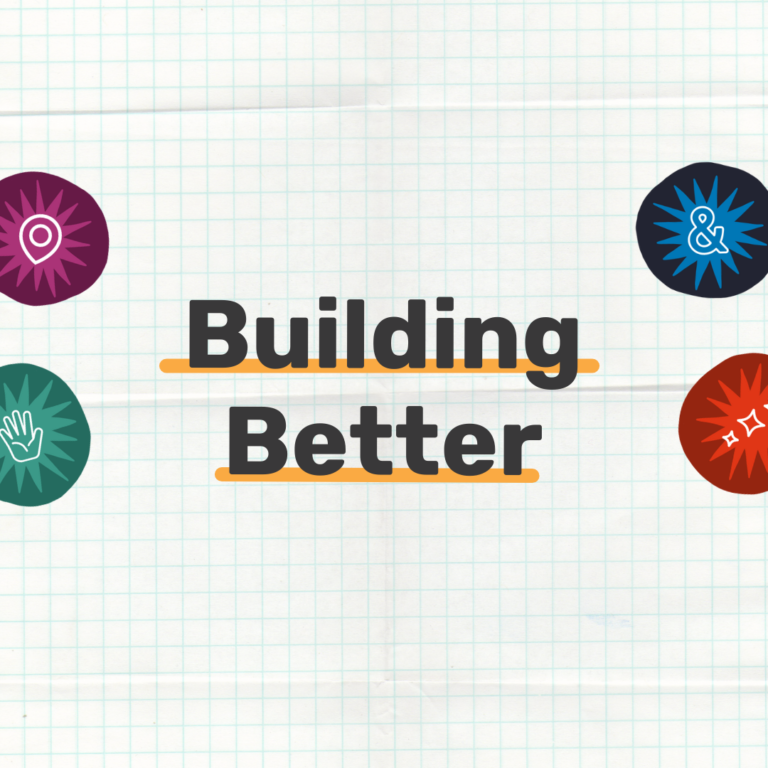Conversations about bringing out our strengths and moving forward through coaching

Overview
4 March 2022 | 24 min and 35s
The world is constantly changing around us and constantly sensing those changes can sometimes lead to us getting stuck – unsure of who we are and where we stand in the world. We talked to Clifton Esteban and Bernice Dy, Habi LXDs and Gallup-Certified Strengths Coaches about their coaching philosophies, meeting their coachees where they’re at, and urging them forward.
Transcript
Introduction / What is coaching
MUSIC: Habi Hour Intro
Jovi (Voice over): What comes to mind when you hear the term “coach” or “coaching?” You might think of a Basketball coach, or a coach of any sport for that matter, directing the next play of their team. You might also picture a gym coach correcting someone’s form as they lift weights.
According to Wikipedia, “coaching is a form of development in which an experienced person, called a coach, supports a learner or client in achieving a specific personal or professional goal by providing training and guidance.” Interesting isn’t it? But how does an actual coach define coaching? What really is coaching for them?
To answer this, we invited Clifton Esteban and Bernice Dy, Learning Experience Designers from Habi to share about coaching. Clifton is one of the co-founders of Habi and is a Gallup-certified Strengths Coach, and Bernice is Habi’s Operations Director and Talent Manager, and is also a Gallup-certified Strengths Coach, providing in-house coaching to our LXDs.
Clifton: I think marami ngang different kinds of coaches, and I see it as an evolution of education. same with how teachers continue to evolve from classroom teaching to being tutors and in a way coaching is the same um but a simple Google search will show you different kinds of coaches that um, continue to grow. There are life coaches. There are health coaches. There are performance coaches. And in a way as it continues to grow and as it continues to be defined by what the people need or what the market wants.
Bernice: Whenever I meet someone new to coaching, it helps for me to describe it the way my own coach described it to me, that coaching is meeting your coachee where they are at. They bring whatever area for growth they want to develop in. They bring whatever challenge they have that they want to gain some perspective on so that they can move forward. Coaching means meeting them where they are. What is the situation today? Let’s look at it, let’s assess, let’s talk about it, and let’s see what are you options moving forward.
Clifton: So what I do in particular is called Clifton Strengths coaching and Clifton strengths coaching is this system of understanding others and people and their characteristics. So what people can expect to be doing with me when they enter into a session is to learn about it. So in terms of coaching style I would say I coach towards the content of Clifton strengths. Um, and there are different kinds of coaches wherein they work on Goal setting or crisis navigation or behavior transformation. Basically I work towards Clifton strengths. And from there, we begin to explore how the person or the coachee can continue to use it wherever he or she may be in either sa work, or sa family niya, sa friends niya etc.
Bernice: My coaching style is very individualized, that is for sure. It really depends on what the coachee brings to the call and we take it from there. So kumustahan. We start with that simple Kumustahan. “What’s been going on?” If they feel that they do not have anything to bring, we can also look into that. “Why they do think like this? What’s on their mind?” Where are they? And then we take it from there. We set goals. “What do they hope to accomplish with the time we have together? What would be successful for them? What would be a good use of their time?” We talk through it, and we navigate the conversation together. We navigate where the coachee is thinking, where they’re going with their thoughts. Sometimes What we started out out, we hope to achieve at the end of the call, it might change midway. We can course correct. We get a better understanding of what it is really they want to move towards, where they want to go towards. At the end of the call, typically we’d have action steps. We’d have options for them to explore and they take that with them.
Change brought by the pandemic
Jovi (voice over): We all know that a lot has changed since 2020 due to the pandemic. And coaching is no different. Let’s listen to what Coach Clifton and Coach Bernice have to share about the changes brought about by the pandemic.
Clifton: ’Yung mas apparent the shift which I think some listeners, if they teach, would share is you shift from the face-to-face to that Telecoaching or remote teaching. And it’s the same with coaching there is a shift from doing face-to-face coaching and now we do a lot of tele coaching. The only struggle I suppose there would be not being able to do some of the tactile activities that Um, we used to be able to do but in a way I think digital tools are enough to be able to deliver a relatively substantial coaching experience.
Bernice: I actually started coaching, the day that the lockdown in the Philippines was announced. So I had just finished my course. The last day was actually canceled because lockdown happened in the Philippines. So I don’t know any other way to coach or I haven’t coached in person with my materials, or my books, or my cards, or my flashcards. I’ve never done it. I’ve only ever done it online. But I think, if the question is about what I enjoy about it, I think I enjoy coaching online because everything is really at your fingertips. You can search your files on the spot. You can share materials with them. So the virtual space is not a hindrance at all to coaching. In fact, it helps, I think. I have, however, met up with some coaches in person, but it’s not in the context of a coaching call. I have been able to meet them, and I can see the potential of coaching face-to-face and the beauty that that also has in terms of sharing the same space, and the presence that you have in the company of your coachee. But so far, my experience coaching online has been a process that I’m growing in and I do enjoy it, but I’m also quite curious about what the potential of face-to-face coaching and how it would help my coachee.
Maintaining the safe space in the online set up
Jovi (voice over): An important medical service that became more widespread and readily available during the pandemic was teleconsultation. Through this, patients need not meet their physicians, psychiatrists, or any other medical expert to consult face-to-face, reducing the risk of contracting or spreading the coronavirus. But not everyone is comfortable with this kind of set up. Especially for medical concerns, this seemed impersonal or awkward.
Coaching had the same problem. So how did Coach Clifton and Coach Bernice maintain safe spaces for their coachees to ease them into this new and different way of coaching?
Clifton: It’s really the discipline of staying present. That would mean just completely letting go of whatever you have been doing and what you are about to do and just stay there. It sounds commonsensical but because of the design of spaces right now in terms of where our laptops are, it doesn’t really lend to focus so much. So I think we have work to do in terms of that, in terms of telecoaching. If we could design a space, or even a device, or even just go back to face-to-face to do it just to target the staying present goal then that is something that I believe would have presence. Like tayong dalawa ngayon, I think you’re very present with me, and I think I’m present with you, and in a way that can lead to better connections I suppose.
Bernice: I think when I want to maintain a connection with my coachee, it’s really preparing beforehand, because the Gallup Clifton Strengths framework has an assessment that has a tool it gives you it’s something that you can study, and read, and prepare for. So I really take time to go over my coachee’s talent themes, so that I can get a sense of where our conversation would go, what they would likely be concerned about, any blind spots that their themes might have, that they need to unlock or unpack. So in order to maintain presence online, it’s really helpful to prepare, write down, have some questions ready, have a framework ready, so that we can go through the coaching call smoothly and get the coachee to where they want to go at the end. So it’s really a lot of preparation and studying also. And a lot of listening, it’s a lot of listening in. When you’re in that call already, it’s a lot of sensing and listening into what it is they’re really saying. The active listening component is very important. Sometimes you can’t even hear it, or you can’t even see how they feel, but you can act it out based on their voice, based on how they’re talking about whatever it is they’re going through. So it helps to show that. Sometimes you can show them, “This is how I feel after listening to you,” and they can let you know, “Yes, that’s how I feel also.” Yeah, so it’s really just making sure that you a lot that time, and give them that time, being present in that moment, whether it’s online or not.
Clifton: Because I do a hybrid of coaching and Clifton strengths mentoring, before, I would be so focused on the agenda of teaching Clifton Strengths. And I suppose teachers could relate to this, but when you’re too hyper focused on what you want to teach and what you want to advocate for in terms of your knowledge and your experience. That kind of leads to less of knowing how your student or coachee would learn, or if they in fact in the first place are ready to learn. So I would say that I was more present in what the content was. I was more present in what I was just meaning to share.
Designing the coaching session
Jovi (voice over): Let’s talk more about being ready for coaching—are there any other preparations needed to coach and be coached? What should be learned or unlearned before coaching?
[light guitar strums]
Clifton: Definitely I find it more convenient to coach the coachees who sign up for coaching rather than coachees who were signed up by an external party. If they were, for example, signed up by another party or they were forced by their boss or their family member, then a different approach would be necessary for the coach to take.
Bernice: I actually started coaching, the day that the lockdown in the Philippines was announced. So I had just finished my course. The last day was actually canceled because lockdown happened in the Philippines. So I don’t know any other way to coach or I haven’t coached in person with my materials, or my books, or my cards, or my flashcards. I’ve never done it. I’ve only ever done it online. But I think, if the question is about what I enjoy about it, I think I enjoy coaching online because everything is really at your fingertips. You can search your files on the spot. You can share materials with them. So the virtual space is not a hindrance at all to coaching. In fact, it helps, I think. I have, however, met up with some coaches in person, but it’s not in the context of a coaching call. I have been able to meet them, and I can see the potential of coaching face-to-face and the beauty that that also has in terms of sharing the same space, and the presence that you have in the company of your coachee. But so far, my experience coaching online has been a process that I’m growing in and I do enjoy it, but I’m also quite curious about what the potential of face-to-face coaching and how it would help my coachee.
Clifton: I used to do a lot more pre-work and a lot less post work. But now that has shifted. I do less pre-work and now more post work. What that means I think in my perspective would be the pre-work is more of just just starting to be there. Ah not a lot of routines. Just a piece of paper and a pen that that’s that’s something I tend still have that now with us. Just just a habit that perhaps is personal to me and personal to some other listeners, and letting the the session guide what I write and what the agenda would be. Taking down notes is when I start to “dump” What has been talked about. So I like writing right away kung ano ang mga nakuha kong observation and not so much judgments yet so auditing session.
I used to be more disciplined in doing that until it started piling up. Listeners who are into research, qualitative research I suppose we could borrow some techniques from them in terms of interpreting data, looking for patterns, analyzing. So kung mayroong magvo-volunteer diyan.
Jovi (voice over): Coach Bernice earlier talked about coaching as “meeting the coachee where they are”. How do you think this could be practiced more intentionally?
Clifton: What I use as a metaphor for myself to always remind myself of this um notion of, of staying side-by-side with the student or the coachee is thinking of myself as the passenger as my coachee would be the driver in a car. So I guess that also moves into how I think about coaching there is some sort of belief that um. The coachee is autonomous in how he or she makes the decisions and in a way he or she kind of knows what he or she wants to do and where to go right? And if we start believing it that way then we could continue to support them in ways that they want to grow rather than drive for them right?
I Like to think of coaching or at least the particular coaching style that I enter into as a choose your own adventure type of coaching. And when they start choosing to ask for advice, then I would still inquire as to what made them ask for it or the context behind it. But normally in the Clifton Strength sense, there would be answers. And that’s also why I continue to use it, because it gives answers to the problems of today in terms of the workforce and how to work productively and happier.
Anyone can coach
Jovi (voice over): We talked a lot about how coaching taps into a lot of people skills: listening, communicating, meeting them where they are, and helping them navigate their situation, and as social beings we have these skills in varying degrees of proficiency. Do you think just anybody can become a coach?
[light guitar strums]
Bernice: I think anyone can become a coach. Anyone can coach as long as their intentions for coaching someone or do talking to someone is to meet them where they’re at and move them forward, help them move forward. It is not prescriptive. It is not judgmental conversations that will move folks or anyone, a coachee, forward, but more listening to where they’re at what do they have in their skill set in their faculties that can help them decide on the many different options what is holding them back. Anyone who approaches a conversation or anyone who, who is hoping to help in that way, can coach coaching is offering questions offering opportunities, offering insight and being a thinking partner, to someone who just wants to move forward or looks for the time to face any challenges or get over challenges or move around challenges so that they can be what they want, and do what they want to do, and help anyone that they want to help.
Clifton: No, it’s actually a very hard question, and the hopeful answer would be yes. But as I begin to be more critical about coaching as a profession I begin to see that there is a certain evolution that I would like to see before the person becomes a coach. There will be people, or there will be coaches, or there will be teachers that do it for the attention, or at least want to be listened to, or want to be heard, or want to prove that their experiences or teachings are superior to the student. If you were to ask me if anyone could be a coach I would say that they would have to go beyond wanting coaching to be focused on themselves and go into making coaching more focused on the other person rather than just wanting to be listened to.
Closing and Synthesis
Jovi (voice over): Can you share what your coachees found to be the most valuable or meaningful take away they had from their coaching experience?
[light guitar strums]
Bernice: Something that I practice is that I also am coached. I also have coach. Speaking for myself, what I get as a coachee from coaching sessions is I get that space and that time to be seen. I get that time to think with someone, reflect with someone. I hae someone to hear me out from my perspective with no judgment, and help me through onto the next step. I find that very valuable, kasi minsan mahirap na when you’re talking to someone or you approach a friend, sometimes it can be prescriptive, sometimes this friend will hear you out but the goal of the conversation isn’t necessarily to move you forward, or it isn’t necessarily you agenda or what you want to work on. It’s really having that that thinking partner with you, that space, that time, that undivided attention to really talk about what you really want to talk about, and really work on your problems or your goals.
Clifton: I think clients value continuity a lot. Continuity in the sense that we remind them of what has happened through the first session or the second session when you’re already in the fifth session. Um, that allows us to understand that there are building blocks to knowledge and as you continue to build on top of each block then you create a more meaningful experience for them and hopefully I get to do that more and more as I continue to write now notes and I continue to be more disciplined about um, reading what has transpired. This, I think, speaks to how friends are, right? Or or family. Say we we are a more, we are attuned to how our relationships are with them because they have seen us through time and they knew how we grew Grew They knew how we matured and evolved so it’s the same with coaching. It’s holding them accountable for But has happened as they hold us accountable for what we have thought and then grow from there.
Jovi (voice over): What about you, as coaches, what were the most valuable or meaningful take aways you got out of the coaching experience?
MUSIC: Habi Hour Outro
Bernice: In many ways, what I valuable in coaching is also what I get out of being coached: I feel seen in that moment and I hope that that is also what I am able to provide. One of the things I know I’m really good at is seeing individuals for who they are and especially who they are at that moment. That’s what I hope to provide to others: this ability that I have to be present and help others to move along towards their goal. That’s something that really energizes me, and it really helps me be there for other people, whatever being there means. Trying to open up options and perspectives and possibilities for them in the end, so that they go where they want to go, they meet their goals, they feel strong, they feel empowered, and they feel more in control of who they are.
Clifton: It’s so exciting in the way that it speaks or it shows how people want to learn and how people teach. I feel that coaching is as I mentioned at the beginning an evolution of the education system. And now that we begin to see the movement from the classroom to a more nimble and personal way of teaching. Information is now omnipresent in a way, so teaching as a profession has to adapt to it. And I see coaching as a way to facilitate the omnipresence of information so that when a child or a coachee has access to it they would more or less know how to filter it, and couple that with the respect that the coaching profession is getting and the new understandings of coaching in terms of new research and how it’s being regulated.
Gerson (voice over): This episode was written, edited, and produced by Habi Education Lab. Original theme music by Howard Luistro. For more Habi Hour episodes, follow us on Spotify, Anchor, Google Podcasts, or visit https://habieducationlab.org/habihour. Salamat sa pakikinig. Thanks for listening.


